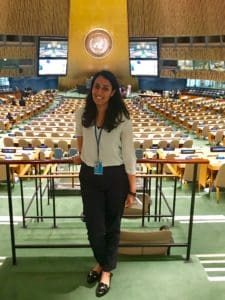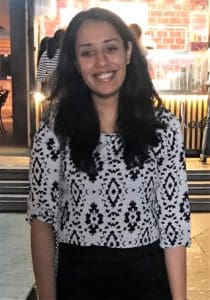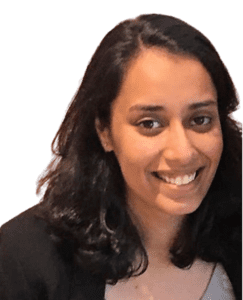Keeping the Humanness Alive Even Amidst Conflict. Member Spotlight: Bhavya Mahajan
Bhavya Mahajan is a 27 years old, talented lawyer and mediator working at the Mumbai Centre for International Arbitration. Despite her young age, Bhavya features great expertise in matters of dispute resolution processes, ranging from experiences as a mediator in the United States to her current engagement in the field of arbitration in India. Bhavya is also an active member of MBBI, having joined the MBBI UN Multilateral Working Group recently.
Taking off: from Rural India to the US
 Growing up in Indian’s peripheries certainly risks constraining one’s opportunities, this is why Bhavya, who was raised in a tiny town in the north of the country, decided to move to a bigger city when she was only 16. Coming from a family of lawyers, she earned a bachelor’s degree in law at the Panjab University. However, vis-à-vis some gaps within the Indian judiciary system, Bhavya developed a strong interest in Alternative Dispute Resolution methods. “India’s litigation system has a huge backlog of cases, and with the resultant delays in disposal of cases, I did not feel attracted to working in the system” Bhavya acknowledges, explaining how litigation procedures are often nor fast neither efficient in terms of resolution; “the most natural choice was to look at the alternatives”.
Growing up in Indian’s peripheries certainly risks constraining one’s opportunities, this is why Bhavya, who was raised in a tiny town in the north of the country, decided to move to a bigger city when she was only 16. Coming from a family of lawyers, she earned a bachelor’s degree in law at the Panjab University. However, vis-à-vis some gaps within the Indian judiciary system, Bhavya developed a strong interest in Alternative Dispute Resolution methods. “India’s litigation system has a huge backlog of cases, and with the resultant delays in disposal of cases, I did not feel attracted to working in the system” Bhavya acknowledges, explaining how litigation procedures are often nor fast neither efficient in terms of resolution; “the most natural choice was to look at the alternatives”.
This led Bhavya to move to the United States and start a Master of Laws in Dispute Resolution at the Pepperdine Caruso School of Law. The overseas experience was revelatory for her as she realized the existence of great differences between the Indian and more Western models of mediation. First and foremost, “mediation in India is mainly limited to personal and family disputes, other areas of mediation are emerging but still minimal, and this is also because mediation centers are mostly connected or funded by the Courts, limiting the scope of their service. The second difference concerns the style of mediation, in India, mediators tend to embrace an evaluative mediation style, while in the West the mediator takes on more the role of the facilitator”. The reason behind this latter aspect lies in India’s cultural aspects where the parties to a dispute find themselves more at ease with somebody they consider ‘an expert’; somebody who is, in their opinion, capable of providing an evaluation of the issue at stake and recommend the best possible outcome.
After finishing her studies, Bhavya embarked on a number of positions, which contributed to both her mediation portfolio and her expertise in the legal field. Firstly, she worked as a mediator at the Los Angeles Superior Court. Subsequently, she undertook a period of internship at the Office of the Ombudsman for United Nations Funds and Programmes, in New York. Finally, she decided to return to India, working as a Public Interest Fellow for IDIA (Increasing Diversity by Increasing Access), a non-profit institution guided by the humanitarian mission of providing access to legal education to the underprivileged in India with the aim of generating more resilient community leaders in defending and claiming their rights.
Working in arbitration with a taste for mediation.
 “What appeals to me the most about mediation is that it keeps the humanness alive even amidst conflict”, Bhavya states, describing how she was attracted and inspired by the vision of building more peace-able societies from a very young age. She says that much of her inspiration towards entering into the mediation field came from her Guru, Sri Sri Ravi Shankar, who is an international humanitarian leader and advocates for a violence-free, peaceful society. “At the heart of spirituality, we believe that the entire world is one family and conflicts are nothing but a difference in vision and perspective. I recognize that mediation allows people in conflict to transcend these boundaries and view things from a holistic perspective”.
“What appeals to me the most about mediation is that it keeps the humanness alive even amidst conflict”, Bhavya states, describing how she was attracted and inspired by the vision of building more peace-able societies from a very young age. She says that much of her inspiration towards entering into the mediation field came from her Guru, Sri Sri Ravi Shankar, who is an international humanitarian leader and advocates for a violence-free, peaceful society. “At the heart of spirituality, we believe that the entire world is one family and conflicts are nothing but a difference in vision and perspective. I recognize that mediation allows people in conflict to transcend these boundaries and view things from a holistic perspective”.
However, making a living out of the mediation profession in India is not an easy thing. “It is very difficult for a young mediator in India to perform mediation as their full-time career” Bhavya concedes. Private mediation, in fact, is taking off slowly in India, owing to a variety of reasons. Just to mention a couple of these, people still lack awareness about the use and advantages of mediation, and also the fact in some cases traditional and ancient practices of dispute resolution continue to replace private mediation or any other legal mechanism.
With her overall specialization in dispute resolution, Bhavya chose to pursue the path of arbitration, currently working as a Case Manager at the Mumbai Centre for International Arbitration. Her role at the Centre is to ensure that the arbitration proceedings in place occur in compliance with the MCIA Rules and the applicable legislation.
 Nevertheless, Bhavya is cultivating her passion for mediation in alternative ways. “While it is financially challenging to pursue a full-time career in mediation, I did not want to be completely away from something I was really passionate about”, she states. That is the main reason why Bhavya decided to join MBBI early this year. She was particularly attracted by the opportunity of expanding her horizons of cultural knowledge. “In being a mediator, understanding cultures and owning an expanded worldview is fundamental, so I considered MBBI to be the optimal opportunity to get in touch with perspectives from people from very different cultural backgrounds”.
Nevertheless, Bhavya is cultivating her passion for mediation in alternative ways. “While it is financially challenging to pursue a full-time career in mediation, I did not want to be completely away from something I was really passionate about”, she states. That is the main reason why Bhavya decided to join MBBI early this year. She was particularly attracted by the opportunity of expanding her horizons of cultural knowledge. “In being a mediator, understanding cultures and owning an expanded worldview is fundamental, so I considered MBBI to be the optimal opportunity to get in touch with perspectives from people from very different cultural backgrounds”.
Besides this, her inspiring experience at the United Nations headquarter motivated the choice of joining the MBBI UN Multilateral Working Group, where she is eager to make her contribution by wisely using her insider knowledge of the UN system.
Written by Matteo Piovacari: MBBI Writer
